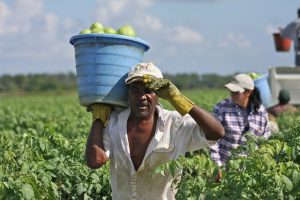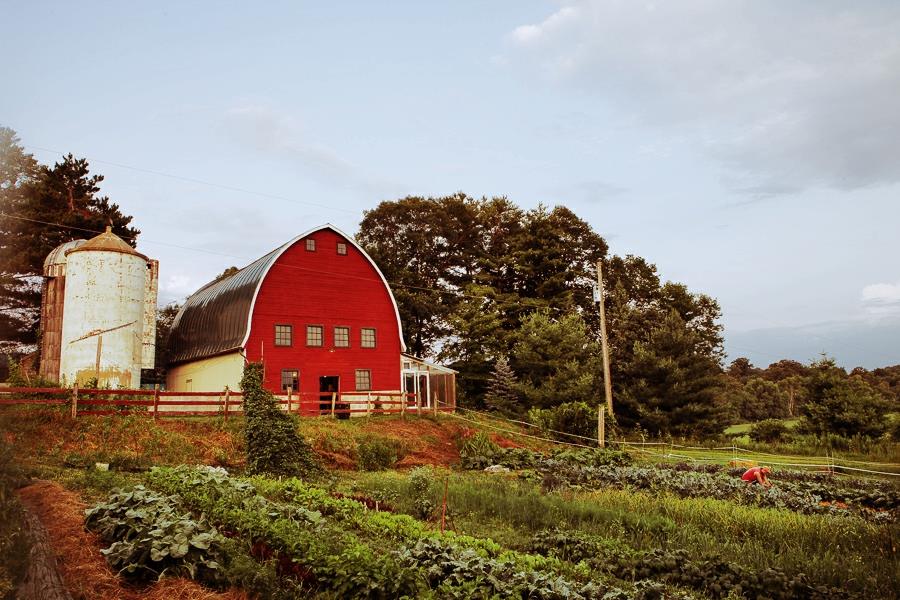May 15, 2020
by Mike Schut, Farm Table Foundation

Two weeks ago, I had a pretty darn long cotton-tipped swab stuck up first one nasal passage and then the other. I didn’t sleep well that night. So I took mental notes—started my own contact tracing in case I’d end up having to report all those possible transmissions to the public health department.
Four days later I got the good news: coronavirus was “not detected.” I suspected that would be the case. I live rurally, avoid the grocery store like the plague (one of those rare instances when such a trope is precisely to the point!) and am not an “essential” worker and so work from home. But that night, as I traced my contacts and thought about being inessential, I also kept thinking about a large group of workers that are essential: agricultural workers.
Perhaps an add topic for 2 AM, but I had recently heard an interview with Gerardo Reyes Chavez, a leader and representative of the Coalition of Immokalee Workers[i], a large community of agricultural workers in Immokalee, Florida. He put three words together in a way I will likely never forget: indispensable but expendable.

The workers he represents are indispensable (like doctors and nurses and grocery store workers). We the people, as represented by our government, have deemed them so. After all, they are growing our food. But they, the Guatemalans and Mexicans and Haitians in Immokalee, are also expendable. Not, mind you, in Gerardo’s eyes, my eyes, or likely your eyes. But when it comes to putting all of us together—all the decisions and brains and policies represented by those eyes—we do consider agricultural workers expendable.
Historical: While I personally hope that our country remembers that the very people we deemed essential to our food supply in the midst of a grave pandemic are the same people we often vilify, castigate, and treat inhumanely as a matter of policy, this is not a reflection on the politics of immigration. I’m taking a longer historical perspective here. Not that long ago the Democratic platform on immigration, under Clinton for example, read essentially the same as Trump’s[ii]. And, at least since the 1970s—when the US Department of Agriculture’s Secretary Earl Butz famously declared to farmers, “Get big or get out”—farming, farmers, and rural communities have been devalued. Whether referring to a Mexican immigrant farmworker, or a fourth-generation Wisconsin farmer, the message isn’t all that fundamentally different: your labor is essential—but you are not; the food you grow is essential—but you are not.
In the case of the Mexican farmworker, we will replace you by hiring another expendable worker. In the case of the Wisconsin farmer, we will replace you by applying more chemicals to the fields, plowing fence row to fence row, and employing ever larger farm machinery.

Moral: Frederick Buechner writes that, “Compassion is that sometimes fatal capacity for feeling what it is like to live inside somebody else’s skin. It’s the knowledge that there can never really be any peace and joy for me until there is peace and joy finally for you too.” For Buechner, compassion is empathy—feeling what it is like to live inside somebody else’s skin—but it is much more. He suggests that compassion also includes justice, which is what I would call the second half of his definition: knowing there can never really be peace and joy for any until there is peace and joy finally for all.
To tell farmworkers and farmers that they are essential, but expendable, is morally wrong and belies the application of what any of us would recognize as compassion.
The coronavirus pandemic certainly offers us the opportunity to reflect on who we are, on what we value. It reveals much of what we have taken for granted, including food on the shelves, reliable and safe national and global food supply chains, and a healthy farm workforce.
The pandemic is clearly a grave crisis; it is therefore also pregnant with great opportunities. One of those is to move personally and societally toward valuing what is just so blatantly essential to life: the farm workers, farms, and soil capable of providing all people—all of whom are essential—with healthy food.
Mike Schut serves as Farm Table Foundation’s Senior Director for Programs and Community Partnerships. His books include Food and Faith: Justice, Joy, and Daily Bread and Money and Faith: The Search for Enough.
[i] For more on the Coalition of Immokalee Workers, see https://ciw-online.org/.
[ii] According to Ezra Klein (author of Why We’re Polarized) in his “On Being” interview with Krista Tippett.
